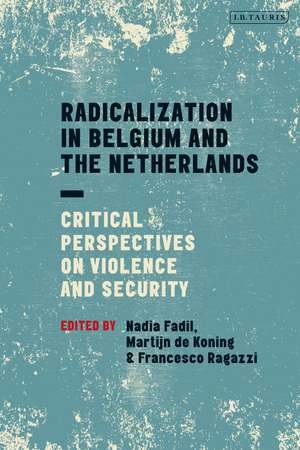Radicalization in Belgium and the Netherlands: Critical Perspectives on Violence and Security
Editat de Dr. Nadia Fadil, Francesco Ragazzi, Martijn de Koningen Limba Engleză Paperback – 25 aug 2021
| Toate formatele și edițiile | Preț | Express |
|---|---|---|
| Paperback (1) | 220.29 lei 6-8 săpt. | |
| Bloomsbury Publishing – 25 aug 2021 | 220.29 lei 6-8 săpt. | |
| Hardback (1) | 658.92 lei 6-8 săpt. | |
| Bloomsbury Publishing – 29 mai 2019 | 658.92 lei 6-8 săpt. |
Preț: 220.29 lei
Preț vechi: 276.27 lei
-20% Nou
Puncte Express: 330
Preț estimativ în valută:
42.15€ • 44.25$ • 34.99£
42.15€ • 44.25$ • 34.99£
Carte tipărită la comandă
Livrare economică 11-25 aprilie
Preluare comenzi: 021 569.72.76
Specificații
ISBN-13: 9780755641239
ISBN-10: 075564123X
Pagini: 344
Ilustrații: 6 b+w integrated
Dimensiuni: 156 x 234 mm
Greutate: 0.48 kg
Editura: Bloomsbury Publishing
Colecția I.B.Tauris
Locul publicării:London, United Kingdom
ISBN-10: 075564123X
Pagini: 344
Ilustrații: 6 b+w integrated
Dimensiuni: 156 x 234 mm
Greutate: 0.48 kg
Editura: Bloomsbury Publishing
Colecția I.B.Tauris
Locul publicării:London, United Kingdom
Caracteristici
Contributes to security studies, the study of Islam in the West, political anthropology, and the anthropology and sociology of religion
Notă biografică
Nadia Fadil is Associate Professor in Anthropology at the Interculturalism, Migration and Minorities Research Centre (IMMRC) at Catholic University of Leuven (KU Leuven) in Belgium. She has published extensively in academic journals, including HAU, Ethnicities, Identities, Social Anthropology, Ethnic and Racial Studies and the Feminist Review as well as in edited volumes.Francesco Ragazzi is Lecturer in International Relations at Leiden University and Associated Scholar at the Centre D'Etude sur les Conflits, Liberté Security (CCLS). He has published widely in peer-reviewed journals including International Political Sociology, Security Dialogue and Political Geography. He has been consulted as an expert on security by the European Parliament, the Council of Europe and the French Senate. Martijn de Koning teaches at the Department of Islamic Studies at Radboud University Nijmegen in the Netherlands. He is also a post-doctoral researcher at the Department of Anthropology at the University of Amsterdam. He has published in the Journal of Muslims in Europe, Anthropology Today and Contemporary Islam.
Cuprins
Introduction. Radicalization: Tracing the Trajectory of an "empty signifier" in the Low Lands Nadia Fadil, Martijn de Koning & Francesco Ragazzi Part I: The circulations of a contested concept Radicalization. De geboorte van een ambigu conceptThe origins and limits of a contested conceptRik Coolsaet Turning 'radicalization' into science. Ambivalent translations into the Dutch(speaking) academic fieldNadia Fadil & Martijn de Koning Considering internal debates on "radicalism" within the Brussels' Islamic community Mieke Groeninck Part II: De/Radicalization policies on the ground Foreign fighters on trial. Sentencing risk, 2013-2017Beatrice de Graaf Pre-emptive measures against radicalization and local partnerships in AntwerpIneke Roex & Floris Vermeulen Countering Radicalization: Hijacking Trust? Dilemmas of Street-Level Bureaucrats in The NetherlandsFrancesco Ragazzi & Lili-Anne de Jongh (De-)radicalization as a negotiated practice. An ethnographic case study in FlandersSilke Jaminé & Nadia Fadil Part III: De/Radicalization and its effects Routinisation and Mobilisation of Injustice: How to live in a regime of surveillance Martijn de Koning Can the 'Muhajir' Speak? European Syria Fighters & the Digital Un/Making of Home Jaafar Alloul No escape: the force of the security frame in academia and beyondAnnelies Moors Conclusions From convert to radical: making critique illegible Iman Lechkar The maze of radicalization: justification and professional interestsDidier Bigo Afterword Afterword: A De/Radicalised FuturePaul Silverstein
Recenzii
"This tightly organized and superbly edited volume on radicalization reveals the development, application, and effects of the term's post 9/11 adoption in the Netherlands (its point of origin) and Belgium. The book offers a compelling analysis of a key political term for our times, one with broad applicability and implication well beyond Northern Europe. An exemplary analysis for anyone interested in critical security studies, contemporary political and critical theory, and European studies."
"A superb collection of critical scholarship that powerfully locates the origins of today's 'age of radicalisation' in discursive shifts in the Netherlands and Belgium over the last twenty years."
"In a world increasingly defined, and divided, by a naïve and interested opposition between 'democratic citizens' and 'radical terrorists,' this collection interrogates the assumptions that sustain this opposition while providing concrete insight into the histories and politics of de/radicalization in the Netherlands and Belgium. It will be an essential point of departure for scholars and policymakers in the field for years to come."
"A superb collection of critical scholarship that powerfully locates the origins of today's 'age of radicalisation' in discursive shifts in the Netherlands and Belgium over the last twenty years."
"In a world increasingly defined, and divided, by a naïve and interested opposition between 'democratic citizens' and 'radical terrorists,' this collection interrogates the assumptions that sustain this opposition while providing concrete insight into the histories and politics of de/radicalization in the Netherlands and Belgium. It will be an essential point of departure for scholars and policymakers in the field for years to come."
